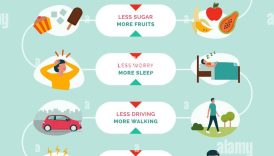Maximizing Your Energy Levels: A Guide to an Active and Healthy Lifestyle

Understanding the Importance of Energy Levels
Energy levels play a vital role in determining how we feel and function throughout the day. From the moment we wake up to when we finally wind down for the day, our energy influences our mood, productivity, and overall well-being. Imagine waking up refreshed, ready to tackle the day, instead of feeling sluggish and unmotivated. Having high energy levels can significantly enhance one’s quality of life. To truly understand the significance of energy, consider these aspects:
- Maximizing Your Energy Levels: A Guide to an Active and Healthy Lifestyle
- Understanding the Importance of Energy Levels
- The Connection Between Energy and Lifestyle
- Importance of Diet for Energy
- Fueling Your Body with the Right Nutrients
- Balancing Macronutrients for Sustained Energy
- Exercise and Physical Activity
- Incorporating Regular Exercise into Your Routine
- The Benefits of Strength Training for Energy Levels
- Quality Sleep and Rest
- Establishing a Nighttime Routine for Better Sleep
- The Impact of Rest and Recovery on Energy
- Stress Management Techniques
- Mindfulness and Meditation for Energy Renewal
- Creating a Work-Life Balance for Sustainable Energy
- Hydration and Its Role in Energy Levels
- Importance of Staying Hydrated Throughout the Day
- Choosing the Right Beverages to Boost Energy
- Supplements for Energy Support
- Understanding the Role of Vitamins and Minerals
- Herbal Supplements for Enhancing Energy Levels
- Productivity: Higher energy often correlates with increased output in work or creative endeavors.
- Mood Regulation: Elevated energy can lead to better interactions and a more positive outlook on life.
- Physical Well-Being: Consistent energy levels support physical activities, making regular exercise enjoyable rather than exhausting.
The Connection Between Energy and Lifestyle
Our lifestyle choices directly impact our energy levels, creating a dynamic relationship between how we live and how energized we feel. Take, for instance, Elena, who found herself drained by mid-afternoon due to her erratic eating habits and lack of exercise. Once she focused on nutritious meals and incorporated walks into her daily routine, her energy soared. Key lifestyle factors that influence energy include:
- Diet: Nutrient-dense foods fuel the body better than processed alternatives.
- Exercise: Regular physical activity boosts stamina and overall energy levels.
- Sleep: Quality rest is essential for energy restoration.
By understanding and actively managing these lifestyle factors, anyone can enhance their energy levels and improve their daily experience.
Importance of Diet for Energy
Fueling Your Body with the Right Nutrients
As we delve into the importance of diet for energy, it’s crucial to emphasize that the right nutrients can be your best ally. Just like a car needs quality fuel to run efficiently, our bodies thrive on nutritious foods. When Anna, a freelance graphic designer, switched from sugary snacks to whole foods, she noticed a significant boost in her focus and energy levels. Eating nutrient-rich foods not only nourishes the body but also supports sustained energy. Essential nutrients to consider include:
- Complex Carbohydrates: Found in whole grains and fruits, they provide a steady energy source.
- Proteins: Essential for muscle repair and growth, proteins keep you feeling full longer.
- Healthy Fats: Sources like avocados and nuts fuel your body’s energy reserves.
Balancing Macronutrients for Sustained Energy
To maintain high energy levels, a well-balanced intake of macronutrients—carbohydrates, proteins, and fats—is essential. It’s about finding the right mix that works for your body. Aiming for a balance in your meals can be as simple as following this guideline:
- 40% Carbohydrates: Focused primarily on whole grains and vegetables.
- 30% Proteins: Including lean meats, legumes, and dairy.
- 30% Fats: Integrated from sources like olive oil, nuts, and seeds.
By prioritizing a balanced diet rich in these macronutrients, anyone can unlock sustained energy levels that enhance daily performance and well-being.
Exercise and Physical Activity
Incorporating Regular Exercise into Your Routine
Transitioning from diet to exercise, regular physical activity stands out as a cornerstone for boosting energy levels. After improving her diet, Laura realized she still felt lethargic until she began incorporating exercise into her daily routine. Finding activities she enjoyed, such as cycling and yoga, made it easier for her to stay consistent. To incorporate exercise into your busy schedule, consider these tips:
- Start Small: Aim for just 15-20 minutes of activity daily and gradually increase the duration as you build stamina.
- Mix It Up: Incorporate a variety of activities—think dancing, swimming, or hiking—to keep things exciting.
- Set a Schedule: Treat your workouts like appointments. Block out time in your calendar to establish a routine.
The Benefits of Strength Training for Energy Levels
When discussing energy levels, strength training often gets overlooked, yet its benefits are substantial. Strength training not only builds muscle but also enhances metabolic efficiency. Mark, a dedicated runner, found that adding weightlifting to his regimen fueled his running endurance, leading to heightened energy throughout his day. Consider the benefits of strength training:
- Increased Muscle Mass: More muscle means a higher resting metabolic rate, which can help with energy expenditure.
- Enhanced Endurance: Regular strength exercises boost overall stamina, making daily activities easier.
- Improved Mood: The endorphins released during strength training can elevate mood, contributing to a more energetic mindset.
By embracing regular exercise, particularly strength training, anyone can experience a powerful boost in energy levels that enhances overall well-being.
Quality Sleep and Rest
Establishing a Nighttime Routine for Better Sleep
Shifting gears from exercise to sleep, establishing a quality nighttime routine is crucial for enhancing energy levels. After struggling with insomnia for months, Jenna decided to prioritize her sleep, creating a bedtime ritual that changed everything. She now starts winding down an hour before bed, signaling to her body that it’s time to rest. To craft your own effective nighttime routine, consider these helpful strategies:
- Set a Consistent Sleep Schedule: Go to bed and wake up at the same time each day, even on weekends.
- Limit Screen Time: Aim to minimize exposure to screens at least an hour before sleep; consider reading a book instead.
- Create a Relaxing Environment: Dim the lights, adjust the room temperature, and invest in comfortable bedding.
The Impact of Rest and Recovery on Energy
Now, let’s discuss the profound impact rest and recovery have on our energy levels. Quality sleep is more than just a luxury; it’s a necessity for both physical and mental rejuvenation. Simon, an avid cyclist, realized that better sleep improved not only his performance but also his daily energy levels. Key benefits of proper rest and recovery include:
- Enhanced Cognitive Function: Improved memory and focus after a good night’s sleep.
- Physical Recovery: Sleep is when the body repairs muscles and tissues, essential after exercise.
- Mood Stabilization: Adequate rest contributes to emotional balance, leaving you feeling more energized and less stressed.
By prioritizing quality sleep and effective recovery, anyone can experience a significant boost in energy to tackle the daily challenges ahead.
Stress Management Techniques
Mindfulness and Meditation for Energy Renewal
As we transition from the significance of quality sleep, it’s essential to address stress management techniques that can significantly impact our energy levels. One of the most effective approaches is incorporating mindfulness and meditation into daily life. After integrating a simple meditation practice into her mornings, Clara discovered that she not only felt more energized but also approached her day with greater clarity and calmness. To harness the benefits of mindfulness and meditation, consider trying these methods:
- Breathing Exercises: Spend a few minutes focusing solely on your breath to center your thoughts and reduce stress.
- Guided Meditations: Utilize apps or online videos that offer guided sessions tailored to energy renewal.
- Mindful Observation: Engage fully in whatever you’re doing, whether it’s eating or walking, which fosters a sense of presence and reduces stress.
Creating a Work-Life Balance for Sustainable Energy
Following mindfulness, let’s explore another essential aspect: achieving a work-life balance to maintain sustainable energy. Mark, a software developer, found himself burned out due to long hours, impacting his performance and overall energy. Once he implemented boundaries, he felt revitalized. Steps to create a better work-life balance include:
- Set Clear Boundaries: Determine specific work hours and stick to them to separate personal time from professional duties.
- Prioritize Self-Care: Schedule regular breaks and make time for hobbies or activities that bring joy.
- Communicate Needs: Discuss workload management with supervisors, ensuring expectations align with personal capacity.
By adopting stress management techniques such as mindfulness and emphasizing work-life balance, anyone can restore their energy and cultivate a more fulfilling life.
Hydration and Its Role in Energy Levels
Importance of Staying Hydrated Throughout the Day
Continuing from stress management techniques, let’s discuss hydration and its crucial role in maintaining energy levels. Many people underestimate just how vital staying hydrated is to their overall well-being. After realizing she often felt fatigued, Olivia began tracking her water intake and quickly noticed a significant boost in her alertness and energy. Staying hydrated is essential for several reasons:
- Physical Performance: Dehydration can lead to fatigue and reduced endurance during physical activities.
- Cognitive Function: Even mild dehydration can impair focus, memory, and overall cognitive capabilities.
- Mood Regulation: Proper hydration contributes to emotional stability, reducing fatigue-related irritability.
To ensure you remain hydrated throughout the day, consider these simple tips:
- Carry a Water Bottle: Keep a reusable water bottle within reach to encourage regular sipping.
- Set Reminders: Use apps or alarms to remind you to drink water at regular intervals.
- Infuse Your Water: Add fresh fruits or herbs for a refreshing twist that encourages more intake.
Choosing the Right Beverages to Boost Energy
Now, let’s explore the importance of selecting the right beverages to enhance energy levels. While water is paramount, certain drinks can provide that extra boost when needed. After experimenting with different beverages, Jamie found that herbal teas and smoothies made a world of difference. Consider incorporating the following options into your routine:
- Green Tea: Provides a gentle caffeine boost without the crash of coffee.
- Coconut Water: An excellent source of electrolytes, perfect for hydrating after workouts.
- Smoothies: Blend fruits, vegetables, and a source of protein for a nutritious energy boost.
By prioritizing hydration and selecting energy-boosting beverages, anyone can elevate their energy levels throughout the day and enhance overall vitality.
Supplements for Energy Support
Understanding the Role of Vitamins and Minerals
As we wrap up our discussion on hydration, it’s time to explore the role of supplements in supporting energy levels. Vitamins and minerals are crucial for numerous bodily functions, including energy production. After feeling constantly drained, Alex decided to investigate whether his diet lacked essential nutrients. He discovered that certain vitamins, particularly B vitamins, play a significant role in converting food into energy. Here are some vital vitamins and minerals for energy support:
- Vitamin B12: Essential for red blood cell formation and energy metabolism, found in meat, fish, and dairy.
- Iron: Necessary for oxygen transport in the body; low iron levels can lead to fatigue. Good sources include spinach and lentils.
- Magnesium: Supports muscle function and energy production; it’s abundant in nuts, seeds, and whole grains.
Prioritizing a diet rich in these nutrients can help enhance your energy.
Herbal Supplements for Enhancing Energy Levels
Alongside vitamins and minerals, herbal supplements can also provide valuable energy boosts. After incorporating ginseng into her routine, Mia found that her afternoon slumps became less frequent, improving her overall productivity. Some popular herbal options to consider include:
- Ginseng: Known for its adaptogenic properties, it may help reduce fatigue and enhance physical performance.
- Rhodiola Rosea: This adaptogen can help improve endurance and reduce fatigue during stressful periods.
- Ashwagandha: Often used to combat stress and improve energy levels, especially for those with hectic lifestyles.
By understanding the role of vitamins, minerals, and herbal supplements, anyone can explore effective ways to support energy levels and enhance their overall vitality.





